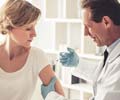Wearing noise-canceling headphones, Michelle, of Yuma, Arizona, was brought into the courtroom in a wheelchair at the start of the proceedings before the U.S. Court of Federal Claims. She stayed only a short time.
Her parents, Theresa and Michael Cedillo, allege that a preservative called thimerosal that had been used in vaccines weakened their daughter's immune system and prevented her body from clearing the measles virus after she was immunized for the disease at age 15 months.Today, Michelle suffers from a long list of health problems, including severe autism, inflammatory bowel disease, glaucoma and epilepsy.
The 12-year-old girl’s parents demand payment under the National Vaccine Injury Compensation Program, a no-fault system that has a $US2.5 billion ($A2.9 billion) fund built up from a tax on vaccines of 75 cents a dose.
The battle royal is a test case having wide ramifications.
Since 1999, more than 4,800 families have filed claims with the government alleging their children developed autism as a result of routine vaccinations containing thimerosal.
The court is being asked to decide whether there is a link between autism and childhood vaccines. If it finds one exists, the families could be eligible for compensation under the Vaccine Injury Compensation Fund, a program established by Congress to ensure an adequate supply of vaccines by safeguarding manufacturers from lawsuits. Under the program, people injured by vaccines receive compensation through a special trust fund.
Advertisement
Monday's case addresses the theory that the cause of autism is the measles, mumps and rubella vaccine in combination with other vaccines containing thimerosal. The preservative, about 50 percent mercury by weight, is no longer found in routine childhood vaccines but is used in some flu shots.
Advertisement
"Monday will mark the first time ever that evidence of autistic harm from childhood vaccines is examined and cross-examined in a court of law," said activist David Kirby, who wrote a book about the purported vaccine and autism link.
Families will try to convince the special "vaccine court" that the vaccines can cause healthy and outgoing children to withdraw into uncommunicative, autistic shells, even though much evidence and expert opinion has found no link.
The court has never heard a case of such magnitude. The shift from laboratory to courtroom means the outcome will hinge not on scientific standards of evidence but on a legal standard of plausibility. Rather than judges, three "special masters" will hear the test cases.
The first test case will ask whether a combination vaccine for measles, mumps and rubella, or MMR, plus a mercury-containing preservative called thimerosal, caused the autism of Michelle Cedillo, now 12.
"The profound downward change in Michelle's health began seven days following the MMR," the Legal Times newspaper quoted Michelle's mother, Theresa Cedillo, as saying.
Vaccine experts point out that parents often link vaccines with their children's symptoms because getting a shot can be upsetting.
They also claim that children are vaccinated at an age when autism and related disorders are often first diagnosed.
They point to two Institute of Medicine reports, in 2001 and 2004, that reviewed the evidence and determined there was no link between vaccines and autism.
"From my standpoint, this question has been asked and answered," Paul Offitt, of the Philadelphia Children's Hospital, told reporters.
It was Dr Offitt who helped invent a rotavirus vaccine. "You know, it's a scientific question," he said. "It's best answered in a scientific venue. It's been done. I mean, the court is not a place to determine scientific truths. The court is a place to settle disputes."
The US Centres for Disease Control and Prevention estimates that about one in every 150 children has autism.
Source-Medindia
GPL/C









